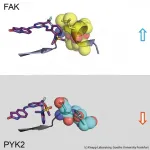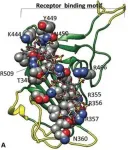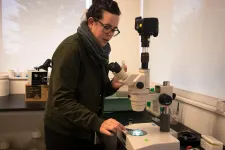(Press-News.org) Washington, DC — Pregnant women who contract SARS-CoV-2, the strain of the virus that causes COVID-19, are at greater risk of dying and experiencing serious complications compared to nonpregnant women who contract the disease, according to a recent report by the Centers for Disease Control and Prevention (CDC).
Now, in a new study to be presented today at the Society for Maternal-Fetal Medicine's (SMFM) annual meeting, The Pregnancy Meeting™, researchers will unveil findings that suggest that pregnant women who become severely or critically ill due to COVID-19 are at greater risk of dying and experiencing serious pregnancy complications compared to pregnant women who have COVID-19 but were asymptomatic, or without symptoms. In contrast, pregnant women with mild or moderate illness were not at higher risk of pregnancy complications than those without symptoms. The study was funded by the Eunice Kennedy Shriver National Institute of Child Health and Human Development.
The study examined medical records of 1,219 pregnant women from 33 hospitals in 14 states from March 1, 2020 to July 31, 2020. All patients tested positive for COVID-19; 47 percent were asymptomatic, 27 percent were mild, 14 percent were moderate, 8 percent were severe, and 4 percent were critical.
Findings showed that pregnant women who become severely or critically ill due to COVID-19 were older, had a higher body mass index, and were more likely to have underlying medical conditions, such as asthma/chronic obstructive pulmonary disease (COPD), diabetes, and high blood pressure. These women were more likely to die or have serious complications, such as cesarean delivery; heavy bleeding after giving birth, known as postpartum hemorrhage; high blood pressure during pregnancy; and preterm birth. High blood pressure and preterm birth also have the potential to cause long-term health problems in women or their infants.
A total of four women (0.3%) died due to COVID-19, a figure that is higher than the death rate for pregnant women without COVID-19. The death rate for pregnant women without COVID-19 is 17.4 deaths per 100,000 live births, according to the latest data from the CDC.
"Our research shows that serious pregnancy complications appear to occur in women who have severe or critical cases of COVID and not those who have mild or moderate cases," said the study's lead author, Torri D. Metz, MD, MS, a maternal-fetal medicine subspecialist and associate professor at the University of Utah Health.
"This information helps us to counsel our patients more effectively. For pregnant women who have contracted a mild or moderate case of COVID-19, these findings can help to alleviate their fears that they are at an increased risk of having serious pregnancy complications due to the disease."
INFORMATION:
About SMFM
The Society for Maternal-Fetal Medicine (SMFM) is a non-profit, membership organization based in Washington, DC. With more than 5,000 physicians, scientists, and women's health professionals around the world, the Society supports the clinical practice of maternal-fetal medicine by providing education, promoting research, and engaging in advocacy to optimize the health of high-risk pregnant women and their babies. SMFM hosts an annual scientific meeting where new ideas and research related to high-risk pregnancies are unveiled and discussed. For more information, visit SMFM.org and connect with the organization on Facebook and Twitter. For the latest 2021 Annual Meeting news and updates, follow the hashtag #smfm21.
FRANKFURT. Many anti-cancer drugs block signals in cancer cells that help degenerated cells to multiply uncontrollably and detach from tissue. For example, blocking the signalling protein FAK, a so-called kinase, causes breast cancer cells to become less mobile and thus less likely to metastasise. The problem is that when FAK is blocked by an inhibitor, the closely related signalling protein PYK2 becomes much more active and thus takes over some of FAK's tasks. The ideal would therefore be an inhibitor that inhibits both FAK and PYK2 in the same way for as ...
An international team of researchers led by the Universities of Liverpool and Keele, working with Public Health England, has found that the common anticoagulant drug heparin inhibits the SARS-Cov2 virus spike protein, by reducing the virus' ability to attach to human cells and infect them.
The research, published in the journals British Journal of Pharmacology, and Thrombosis and Haemostasis, found that heparin interacts with the spike protein on the surface of coronavirus (SARS-CoV2), destabilising its structure and preventing it from docking with the ACE2 receptor on human ...
The American lobster, which supports the most valuable fishery in North America, may be more susceptible to the effects of climate change than previously thought, according to a new study published in END ...
EAST LANSING, Mich. - For Michigan State University's Felicia Wu, the surprise isn't that people who work with livestock are at higher risk of picking up antibiotic-resistant bacteria, but instead how much higher their risk levels are.
"This is a bit of a wakeup call," said Wu, John. A Hannah Distinguished Professor in the Departments of Food Science and Human Nutrition and Agricultural, Food and Resource Economics. "I don't think there was much awareness that swine workers are at such high risk, for example. Or that large animal vets are also at extremely high risk."
Compared with individuals who don't work with animals, those working on swine farms are more than 15 times more likely to harbor a particular strain of a bacterium known as methicillin-resistant ...
The increased global use of antiviral and antiretroviral medication could have a detrimental impact on crops and potentially heighten resistance to their effects, new research has suggested.
Scientists from the UK and Kenya found that lettuce plants exposed to a higher concentration of four commonly-used drugs could be more than a third smaller in biomass than those grown in a drug-free environment.
They also examined how the chemicals transferred throughout the crop and found that, in some cases, concentrations were as strong in the leaves as they were in the roots.
The study - published in Science of the Total Environment - was conducted by environmental chemists from the University of Plymouth (UK), Kisii University (Kenya) and ...
An international team of researchers has characterized the effect and molecular mechanisms of an amino acid change in the SARS-CoV-2 Spike protein N439K. Viruses with this mutation are both common and rapidly spreading around the globe. The peer reviewed version of the study appears January 25 in the journal Cell.
Investigators found that viruses carrying this mutation are similar to the wild-type virus in their virulence and ability to spread but can bind to the human angiotensin converting enzyme 2 (ACE2) receptor more strongly. Importantly, researchers show that this mutation confers resistance to some individual's serum antibodies and against many neutralizing monoclonal antibodies, including one that is part of a treatment authorized for emergency use by the U.S. ...
The multidisciplinary research group Lactiker - Quality and Safety of Foods from Animal Origin, which is attached to the University of the Basque Country (UPV/EHU), is working on (among other things) characterising the biochemical, microbiological and technological processes involved in cheese manufacturing that have a direct impact on its technological, nutritional and sensory quality, as well as on its food safety status. The aim is to provide the cheesemaking industry with the information it requires to ensure safe, high-quality products.
The group, which has been working in this field for 25 years, has conducted studies focusing on all aspects of the production of cheeses under the Idiazabal Protected Designation of Origin ...
More effective antiviral treatments could be on the way after research from The University of Texas at Austin sheds new light on the COVID-19 antiviral drug remdesivir, the only treatment of its kind currently approved in the U.S. for the coronavirus.
The study is END ...
BOSTON - Investments in infrastructure to promote bicycling and walking could save as many as 770 lives and $7.6 billion each year across 12 northeastern states and the District of Columbia under the proposed Transportation and Climate Initiative (TCI), according to a new Boston University School of Public Health (BUSPH) and Harvard T.H. Chan School of Public Health study.
Published in the Journal of Urban Health, the analysis shows that the monetary benefit of lives saved from increased walking and cycling far exceed the estimated annual investment for such infrastructure, without ...
DURHAM, N.C. -- Malaria is an ancient scourge, but it's still leaving its mark on the human genome. And now, researchers have uncovered recent traces of adaptation to malaria in the DNA of people from Cabo Verde, an island nation off the African coast.
An archipelago of ten islands in the Atlantic Ocean some 385 miles offshore from Senegal, Cabo Verde was uninhabited until the mid-1400s, when it was colonized by Portuguese sailors who brought enslaved Africans with them and forced them to work the land.
The Africans who were forcibly brought to Cabo Verde carried ...




